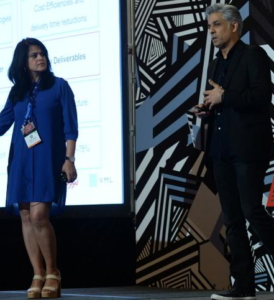APAC Agencies Must Help Brands Look Beyond Numbers


Contrary to what is commonly pitched in Asia-Pacific, numbers are not the best way to measure the success of marketing initiatives; but a change in this mindset will need to come first from agencies.
In an interview with ExchangeWire, VML Southeast Asia and India CEO Tripti Lochan expressed frustration over the overemphasis on numbers as the only way to measure campaigns.
Pointing to digital agencies, Lochan said the industry had so heavily championed the capabilities of digital to measure everything, including number of views and conversion, that it put numbers at the centre of everything it did.
"But there are measurements beyond that", she said. "We have boxed ourselves into a space where we're cannibalising ourselves when, [in reality], nobody lives only in the offline world or only in the online world."
She explained that consumers might see an ad online that could lead them to make a buying decision in a physical retail store. This correlation should be better established, she noted.
"Digital agencies are so caught up in measuring themselves that we're not connecting that properly the way we should", she said. "Today, digital agencies [shouldn't be] about digital marketing. It's about [building] an experience."
Asked, though, if this was perhaps due to brands insisting on measurements for their campaigns, Lochan said: "Yes, but we've led them that way." She urged agencies to start pitching to brands about the need to build an experience for consumers, which might not always be easily measured by numbers, and this could trigger a different reaction from brands.

VML's Tripti Lochan & Kellogg's Nadeem Amin
In agreement was Nadeem Amin, Kellogg's regional digital marketing manager for Asia-Pacific, ANZ, and South Africa. VML is the FMCG company's regional marketing technology partner.
Pointing to programmatic as an example, Amin said the technology was only as good as the data fed into it. He agreed with Lochan's view that the industry was too focused on data, noting that it was not a terminology consumers were concerned about. The focus, instead, should be on bridging the offline-to-online experience and this emphasis was currently missing, he said.
Asked whether he would be willing then to overlook the need for numbers-based metrics and, if so, how would he measure the success of campaigns, he noted that data would still be analysed, but so would the impact made on the ground.
"Kellogg being a very traditional company, we definitely look at different areas and angles", Amin said. "The infrastructure we have is not completely digital. We partner massively with retailers as well so we get their understanding first-hand."
He said the company looked at impact on both online and offline to understand how the convergence was playing out.
He noted that, with digital marketing still fairly new, there were still things to figure out. Conversions from social media, for instance, could not be accurately determined and were mostly guesswork.
He noted that it might be possible to establish proper measurements for some businesses, such as e-commerce sites, where all transactions were made online, but this would not be applicable to all businesses.
He added that Kellogg realised, for some brands, it could not look purely at data as there were other factors influencing consumers' buying decision.
Lochan said: "And because we have made this numbers-driven measurement into such a big thing, our services are getting commoditised. It really frustrates me sometimes. How can we put a number into discussions between agencies related to being paid per Likes.
"As agencies, we need to get out of this [mindset] and say it's about the long-term engagement with your consumers. And this won't happen with one campaign, but over a period of time, and we need to partner well to get that longevity", she said.
Creative experience a competitive differentiator
Against the likes of McKinsey and IBM, however, digital agencies do have a clear advantage.
Asked if he would choose to work directly with consulting firms and ad tech vendors, rather than agencies, Amin chose the latter. "If you ask me, it's very clear why we work with VML and agencies. The business we're in is not about software development, it's a creative business", he said. "And for a creative business, you need a creative agency that also understands the technology, the digital, and hardware delivery."
"The Accentures and McKinseys are good at the planning stage, but lack the creative overview of how business works and evolves. Having a creative agency is key to success [in this aspect]", he noted.
Lochan added that, while ad tech vendors and consulting firms might have scale, which could prove an advantage when huge deployments were involved, this would not be always have relevance. "We're not talking about huge deployments all the time. It's about intricacies of markets where it's about consultative partnership. And this is where agencies have an edge over a huge software development vendor", she said.
Amin said consulting firms and tech vendors still had a role to play, though, at an "enterprise-level shift" where newer technologies were involved and the best way to approach such technologies had to be established. Advice on cloud services, for example, would be better dished out by these vendors, he said.
Lochan and Amin took the stage together at last month's Adobe Symposium to discuss synergies between technology and marketing platforms.
Ad TechAdvertiserAgencyAPACBrandingDataMeasurementProgrammatic








Follow ExchangeWire